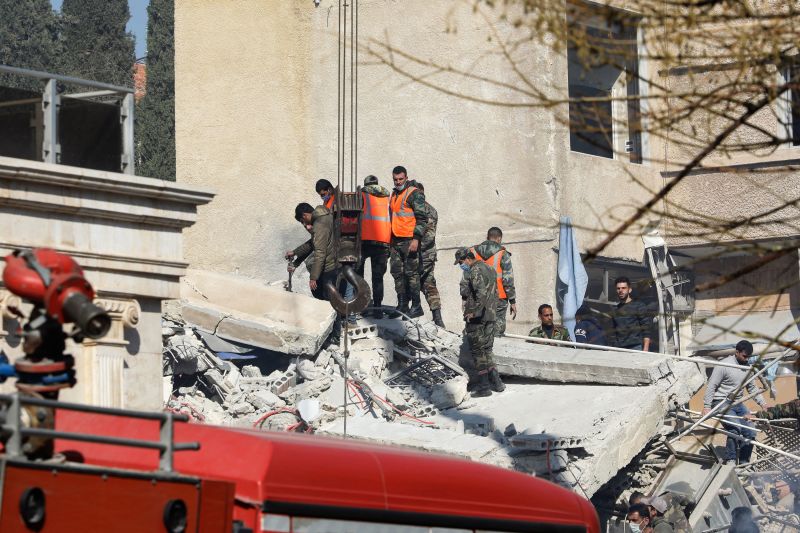
Escalating Tensions in the Middle East: Israeli Missile Strike Kills Iranian Advisors and Syrian Forces in Damascus

The recent Israeli missile strike in Damascus has further intensified the already heightened tensions in the Middle East, resulting in the loss of Iranian military advisors and Syrian forces. The strike, which targeted a building in the Mazzeh neighborhood, has raised concerns about the potential spillover of conflict in the region. This article provides an in-depth analysis of the incident and its broader implications on the ongoing conflicts in the Middle East.
The Israeli Missile Strike
In a recent escalation of hostilities, at least five Iranian military advisors and a number of Syrian forces were killed in an Israeli missile strike on a building in Damascus. The strike, which took place in the Mazzeh neighborhood, has raised significant concerns about the growing tensions in the region. The Syrian Ministry of Defense alleged that the air attack was launched from the Golan Heights, targeting a residential building in the area. The aftermath of the strike resulted in damage to several buildings and nearby vehicles, with ongoing search and rescue operations for trapped victims. The Israel Defense Forces have refrained from commenting on the incident, further adding to the complexity of the situation.
Security and emergency personnel search the rubble of a building destroyed in Damascus on January 20, 2024.
Among the casualties, Hojjatollah Omidvar, described as a deputy chief of the Quds Force intelligence unit in Syria, was among the deceased. The Islamic Revolutionary Guard Corps (IRGC) identified the others killed as military advisors Ali Aghazadeh, Hossein Mohammadi, Saeed Karimi, and Mohammad Amin Samadi. Their presence in Syria was officially acknowledged as being at the invitation of the Syrian government, as stated by Iranian foreign ministry spokesperson Nasser Kanaani.
The attack in Damascus has further exacerbated concerns about the potential spillover of conflict in the region. This incident, coupled with other recent events, has raised fears of a broader regional war. The ongoing conflicts involving Israel, Hamas, Hezbollah, and Houthi rebels have heightened tensions, posing significant challenges to regional stability and security.
Regional Spillover Fears
The attack in Damascus has occurred against the backdrop of mounting concerns about the potential regional spillover of conflicts involving Israel, Hamas, Hezbollah, and Houthi rebels. The recent escalation of tensions has raised fears of a broader regional war, with various incidents across the Middle East contributing to the heightened state of alert. The Iranian missile attack in northern Iraq, targeting a purported spy base for Israeli intelligence agency Mossad, and the near-daily confrontations between Hezbollah and Israeli forces in Lebanon have further compounded the regional tensions.
Iranian Foreign Minister Hossein Amir-Abdollahian emphasized the interconnected nature of the conflicts, highlighting the link between the ongoing war in Gaza and the broader crisis and attacks in the region. The impact of these conflicts has been devastating, with a significant loss of life and ongoing humanitarian concerns. The involvement of external actors, including the US, has added another layer of complexity to the situation, with military strikes and diplomatic efforts aimed at de-escalating the conflicts.
The challenges of achieving de-escalation are substantial, as evidenced by the vows of retaliation by Iranian President Ebrahim Raisi following the Damascus missile strike. The potential for further escalation and the implications for regional stability remain significant, posing critical questions about the path to resolving the conflicts and ensuring lasting peace in the Middle East.
Conclusion
The Israeli missile strike in Damascus and its aftermath have underscored the complex and interconnected nature of the conflicts in the Middle East. The loss of Iranian military advisors and Syrian forces in the strike has further heightened tensions in the region, with concerns about the potential spillover of conflict and the challenges of achieving de-escalation. The involvement of multiple actors, including Iran, Israel, Hamas, Hezbollah, and the US, has added layers of complexity to the situation, making the path to resolution and lasting peace a daunting task.
As the region grapples with the aftermath of the recent events, the need for diplomatic efforts, dialogue, and humanitarian action becomes increasingly urgent. The impact of the conflicts on civilian populations, the threat to regional stability, and the broader implications for international relations necessitate a concerted and coordinated approach to address the root causes of the conflicts and work towards sustainable solutions.
The Israeli missile strike in Damascus serves as a stark reminder of the fragility of peace in the Middle East and the imperative of finding avenues for dialogue and resolution. The challenges ahead are formidable, but the pursuit of peace and stability in the region remains a critical endeavor that demands unwavering commitment and concerted international cooperation.














